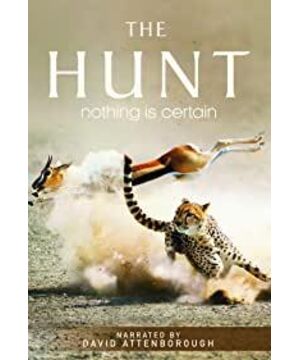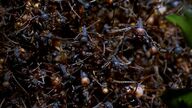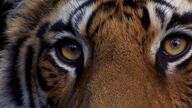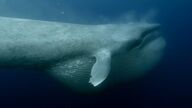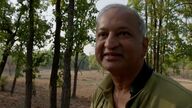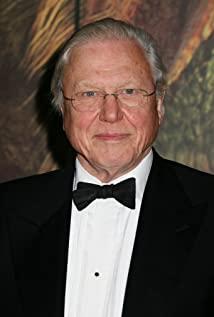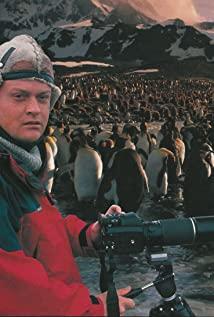"Not only do prey migrate, but predators also migrate." That's right, a blue whale took her baby whale on a migratory journey. "In one month, her baby will be able to withstand the impact of the waves, but not yet." During their migration process, whether the baby whale can grow up smoothly can only depend on his fortune. Against the backdrop of azure tones, the mother and son look extraordinarily close. Unexpectedly, all the calm is temporary, and danger comes quietly. In the heavy melody, the whale mother struggled to protect her child, and the child was swimming desperately. But, as we all know, survival of the fittest, no exceptions. "The killer whales succeeded, and the teamwork allowed them to overcome difficulties." But this success was as dull as their failure. Nothing to call it an accident. In nature, everything is normal, even the creature at the top of the food chain has its enemies, its opponents. Life is so normal in nature. Just as the killer whale overcame a blue whale that was several times larger than his size, nothing would change in nature, and everything would remain the same. First of all, the azure shade interprets the marine situation. In this battle of the blue waters, baby whales are the prey and killer whales are the predators. What a blue sea, it is fascinating to think about it. But when you know the turbulent waves and bloody cruelty behind this calm, will you still yearn for this? What we see is the desperate struggle of the mother whale to protect the child, the righteousness of the male whale to protect the same kind, and the same Killer whales are unscrupulous for survival. Who said that animals have no emotions, but the feelings between them are more and more incomprehensible and more profound in our eyes. Against the backdrop of the azure waters, this war looks so beautiful. In nature, such fierce struggles are everywhere, the ocean is too big, the world is too big. In places we can't see, countless creatures die because of starvation, predation or natural disasters, and more often they have to follow nature. with no exceptions. Second, soulful narration interprets cruel competition. "The fight between predator and prey is as dramatic as everything else in nature, the stakes are high, and it's life and death for both parties. Surprisingly, however, it's usually the predator who loses. ." This is a narration from the documentary. After playing this clip of the combination of sound and picture, I realized that the principle of survival of the fittest and natural selection in nature is so cruel. As long as you are in the food chain, there is no so-called strong or weak, because as long as you have to rely on the other party to survive, the other party is tantamount to strangling your lifeline. In the food chain of nature, once any link in the food chain has a problem, for other links in the food chain , can be fatal blows. The killer whale put his life at stake, and he had to do it in order to survive. Isn't that the case with blue whales? He regarded the other party as his lifeline before this series of struggles and killings occurred. The same is true in the human world, and such principles are valid everywhere. We often have more to learn from nature than that. Again, the heavy melody contrasts the fragile creatures. Our mood is suddenly complicated by the gradually heavier music that is quietly remembered in the film. Watch the killer whale drag the baby whale off its mother's back, then watch it drown, get killed, and be preyed on. My mood is also gradually heavy with the music. How fragile life is. In the heart of the blue whale mother, the child who was alive and kicking a second ago was buried in the belly of the killer whale. In my heart, such a fresh life died just like that. But I thought about it again and maybe it's better to die by nature than by human hands. Human beings can do anything for profit. If you encounter humans during the migration process, it may not only be the baby whales that die, but even the mother whales and even killer whales are doomed. This is nature, and if there is a race more cruel than lions in this nature, it is only human. In front of nature, everything seems so small and fragile. Every advantage will always be accompanied by a disadvantage, and every advantage will always become a disadvantage in the face of other advantages. Obviously, both predators and prey, they seem to know this. So, in this documentary, you'll see predators that are careful, step-by-step, and you'll see unyielding, dying prey. Nature is wonderful. In the struggle between blue whales and killer whales, against the backdrop of azure blue, how vividly the fierce competition is displayed. In the heavy melody, we feel the fragility of life and the cruelty of nature. "Natural selection, survival of the fittest" Only when we see this, we truly feel the true meaning and wonder of Darwin's theory of evolution. How fragile life is. In the heart of the blue whale mother, the child who was alive and kicking a second ago was buried in the belly of the killer whale. In my heart, such a fresh life died just like that. But I thought about it again and maybe it's better to die by nature than by human hands. Human beings can do anything for profit. If you encounter humans during the migration process, it may not only be the baby whales that die, but even the mother whales and even killer whales are doomed. This is nature, and if there is a race more cruel than lions in this nature, it is only human. In front of nature, everything seems so small and fragile. Every advantage will always be accompanied by a disadvantage, and every advantage will always become a disadvantage in the face of other advantages. Obviously, both predators and prey, they seem to know this. So, in this documentary, you'll see predators that are careful, step-by-step, and you'll see unyielding, dying prey. Nature is wonderful. In the struggle between blue whales and killer whales, against the backdrop of azure blue, how vividly the fierce competition is displayed. In the heavy melody, we feel the fragility of life and the cruelty of nature. "Natural selection, survival of the fittest" Only when we see this, we truly feel the true meaning and wonder of Darwin's theory of evolution. How fragile life is. In the heart of the blue whale mother, the child who was alive and kicking a second ago was buried in the belly of the killer whale. In my heart, such a fresh life died just like that. But I thought about it again and maybe it's better to die by nature than by human hands. Human beings can do anything for profit. If you encounter humans during the migration process, it may not only be the baby whales that die, but even the mother whales and even killer whales are doomed. This is nature, and if there is a race more cruel than lions in this nature, it is only human. In front of nature, everything seems so small and fragile. Every advantage will always be accompanied by a disadvantage, and every advantage will always become a disadvantage in the face of other advantages. Obviously, both predators and prey, they seem to know this. So, in this documentary, you'll see predators that are careful, step-by-step, and you'll see unyielding, dying prey. Nature is wonderful. In the struggle between blue whales and killer whales, against the backdrop of azure blue, how vividly the fierce competition is displayed. In the heavy melody, we feel the fragility of life and the cruelty of nature. "Natural selection, survival of the fittest" Only when we see this, we truly feel the true meaning and wonder of Darwin's theory of evolution.
View more about The Hunt reviews


